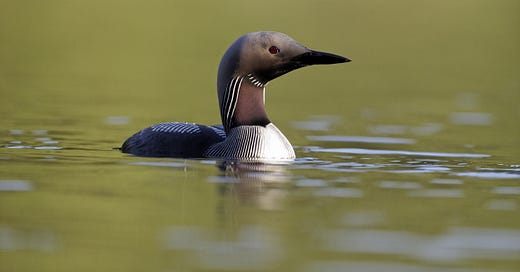The Black-throated Diver is a sleek, rather elusive visitor hat birders across Britain know to keep an eye out for each winter. Often associated with our coasts, these birds have the added intrigue of occasionally venturing inland, especially to large reservoirs or lakes. If you're based near places like Rutland Water or the Scottish lochs, you might just spot one in calmer waters, adding a bit of excitement to the usual line-up of wintering waterbirds.
In winter, the Black-throated Diver wears a fairly understated plumage—mostly greys and whites, with a dusky cap and a pale throat. It’s not as large or bulky as the Great Northern Diver, and unlike the Red-throated Diver, it generally holds its bill horizontally. Spotting one amongst other divers or wintering grebes can be a challenge, but their sleeker, more refined profile usually sets them apart, especially at closer range.
While the summer plumage is far more striking with its black throat and patterned neck, winter birdwatchers will find this bird’s subtler beauty worth noting. The dark eyes and streamlined build make it look refined, even in its subdued state. The bird’s call, however—described as eerie, like a distant wail—is rarely heard in Britain, as it tends to reserve this haunting sound for breeding grounds in northern Europe and Scandinavia.
The Black-throated Diver is a powerful swimmer, diving down with ease in search of fish, its primary diet. They are strong fliers too, but you’re more likely to spot one diving than flying, as they spend much of their time patrolling for food below the water's surface. If you're patient, you may see one surface with its catch, a flash of silver fish in its beak.
Look for these birds in larger bodies of freshwater inland, where they sometimes rest, or along Britain’s coasts, especially sheltered bays and estuaries. Black-throated Divers are most common in northern and western Britain, but a sharp-eyed birder can spot one further south, especially during migration or when they stray from their usual haunts.
Black-throated Divers have a stable population across their range but remain vulnerable to pollution, especially oil spills, which can affect their coastal feeding grounds. In recent years, changes to fisheries and habitat have also had impacts, as these birds rely on clean, fish-rich waters to survive.
For British birdwatchers, the Black-throated Diver is a winter treat, whether it appears as a lone figure on a remote loch or as a rare inland visitor. Next time you’re out by the water, scan carefully—you may just catch a glimpse of this graceful traveller.
Remember to subscribe!





Live the elegant writing to match the discrete plumage !